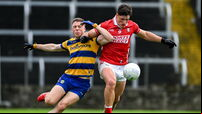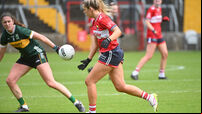What's gained from post-match interviews in modern sport?

Japan's Naomi Osaka returns the ball to Romania's Patricia Maria Tig during her first-round victory in the French Open at the Roland Garros Stadium, Paris. She quit the tournament citing mental health issues arising from post-match interviews. Picture: AP Photo/Christophe Ena
EARLIER in the week, the news that tennis' world number two Naomi Osaka was to be fined and threatened with expulsion by the French Open for not doing a press conference after her first-round victory, smacked of a spoilt millionaire sports star throwing a tantrum and refusing to talk to media and therefore rightly punished by the tournament's governing body.
A couple of days later, Osaka withdrew totally from the tournament stating that she has been suffering from “depression” and “anxiety” on an ongoing basis and found that having to fulfil media requirements was adding to her stress and mental health anxieties.
Suddenly, the French Open's sanctions was not a good look for the authorities at Roland Garros. To be fair, they could not know Osaka's mental health issues and were merely following through on the contractual obligation Osaka and all professional tennis players sign up to, which demands that all players need to talk to the media when required after every match during a tournament.
The controversy has brought to a head the long-standing issue of media access to sports players and management, and the value such meetings have for either the sport or the media.
Every one of us can relate to the stress of public speaking, that stress is exaggerated when talking to the 'world' through the medium of the press that in some cases is looking to find fault in your performance or even your character.

A recent social media video doing the rounds showed Man City players celebrating their recent Premier League title triumph, after their last game of the season against Everton, as players and coaching staff hugged and celebrated together. One of the stars of the team, Kevin de Bruyne, is seen jumping for joy with his teammates, a wide smile across his face until he was approached by a member of the City staff who tells him he is wanted to do the post-match interview. The smile quickly dropped from de Bruyne's face and you did not need to be a lip-reader to understand when he mouthed, "Ah for f**k sake".
De Bruyne professionally fulfilled his duty to the club by doing the TV interview, which I saw live at the time. It was concise and polite, he answered the questions and it was totally forgettable. I do not recall one syllable from the interview as it was just another one of those post-game drones we have all become so accustomed to and that we no longer heed what is being said.
The novelty of having access to the superstars of sport waned a long time ago. But it is part of the game and with so many other sports and other distractions on the airwaves and internet it is understandable that individual sports insist their stars are available to the press for maximum exposure.
For the media itself, it's a bit of a poisoned chalice task too. Long waits followed by frantic questions to a bored if not angry interviewee, is hardly ideal. Plus there is the risk of the interview going against you. Who would have wanted to be in Tony O'Donoghue's shoes when Martin O'Neill turned against him? or any interviewer facing Alex Ferguson after a Man United defeat? Or even Trevor Welch speaking to a Jose Mourinho more interested in munching Custard Creams?
Our sympathy for professional sports stars or the media having to do interviews may be one thing. Seeing the amateur stars of the GAA struggle with the task is another thing altogether. I think most of us would understand if GAA players were excused from the exercise of answering questions immediately after the game.
To be honest, the vast majority of these interviews are painful to watch, ranging from monosyllabic replies to terrified expressions. Sure some are more accomplished and if they are willing let them do it. Otherwise, let the manager do the talking. He's the fella calling the shots anyway.

Indeed, it's the managers and their outbursts that have produced the real memorable interviews over the years. The Davy Fitz controlled fury in GAA, the Mourinho self-promoting "special-one" in soccer, Brendan Venter's "Mike Bassett" homage in rugby.
There are the funny ones: Kieran Donaghy calling out Joe Brolly in Gaelic Football, Shane Long's triumphant "yessss!" moment after scoring the winner against . And who could forget the strangest OTT interview in Irish sport when Brian O'Driscoll spent an entire post-game chat indulging in product placement for an isotonic drink when answering his questions.

For many, the funniest post-match interview is, the much replayed and often quoted, "I would love it if we could beat them" meltdown by Newcastle manager Kevin Keegan in 'that interview' at the height of the 1996 Premier League title race against Man United. We all had a good laugh at Keegan losing the plot under pressure.
But were we witnessing a sort of mental breakdown by a man under severe pressure in his job, forced to address those pressures under the spotlight of the media eye?
If it was put to us that way now, would Keegan's outburst still be as funny to us?







 App?
App?







